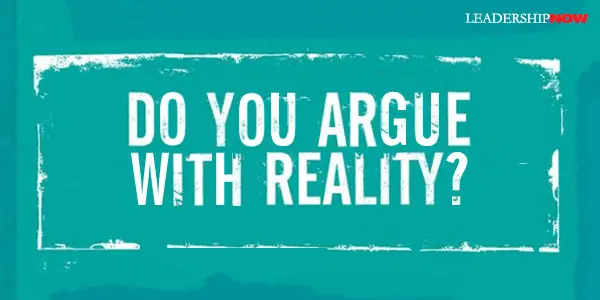 |
 |
09.20.10

Do You Argue With Reality?
CHRIS THURMAN wrote in The Lies We Believe, “The number one cause of our unhappiness are the lies we believe in life.” Too often, we operate apart from reality. Given a choice between reality and our version of it, we are inclined to choose the latter. It is a central tendency of human beings. The result is drama, not peace. “Instead of getting the results we want,” says Cy Wakeman, “we end up with reasons, stories, and excuses for why things didn’t work out—leading to more drama, disengagement, judgment, and ineffective leadership.” In Reality-Based Leadership, Wakeman presents a much-needed wake-up call. We can ditch the drama by getting in touch with what is. Quit making up stories. Quit arguing with reality. Ditching the stories that are causing us stress. “We all tell ourselves stories and live with the resulting drama.” It sounds like:“I shouldn’t have to do this—it’s not part of my job description.
“You are arguing with reality whenever you judge your situation in terms of right and wrong instead of fearlessly confronting what is.” You need to respond to the facts, not the story you create about the facts. This is easier said than done. Interwoven in our stories are our egos, insecurities, and identities. (At one point Wakeman suggests we ask, “Who am I as a manager or as an employee when I believe this story?”) We like our stories. They make us look better. They place the blame somewhere south of us. If other people are always coming up short in our stories, then it’s all about us. But letting go of our stories is not always easy as we have a lot invested in them. Too often our criticism is about setting us apart from others and not about helping them. It says a lot more about us than it does those it is directed towards. Wakeman says, “When you are judging you are not leading.” In her analysis of the case study about Steve and a team he dreaded working with, she concludes, “his biggest obstacle is his belief that they are a negative group. What if he just dropped that whole story and simply responded to reality directly? The phone rings? Answer it. The team ask a question? Answer it, or teach them where to find the answer. The team share what worked in the past? Listen and lead them into the future. The team requests some time with the leader? Engage with them—lead! When Steve began to lead the team rather than judge and criticize, the team began to change for the better.” She adds, “When you focus your energy on what you are able to give And create rather than what you receive, you are truly serving.” Do you see any applications in what you and involved in? Wakeman insightfully writes: “What is missing from a situation is that which you are not giving.” Operating out of a judging mindset of “I know” or “I am right” effectively shuts down the potential to learn or accomplish anything. Moving on based in reality requires setting the story aside and asking, “If I set the story aside, what would I do to help?” The minute you start judging is the very minute you quit leading, serving and adding value. When you’re in judgment, you are dealing with your story—not with reality. Wakeman suggests that when you get off-track:
What stories are you telling yourself that cause you to operate in your own world? While it may be cognitively economical, it is costing you far more in every other area. 
Posted by Michael McKinney at 03:54 PM
|
BUILD YOUR KNOWLEDGE
 

How to Do Your Start-Up Right STRAIGHT TALK FOR START-UPS 
Grow Your Leadership Skills NEW AND UPCOMING LEADERSHIP BOOKS 
Leadership Minute BITE-SIZE CONCEPTS YOU CAN CHEW ON 
Classic Leadership Books BOOKS TO READ BEFORE YOU LEAD |